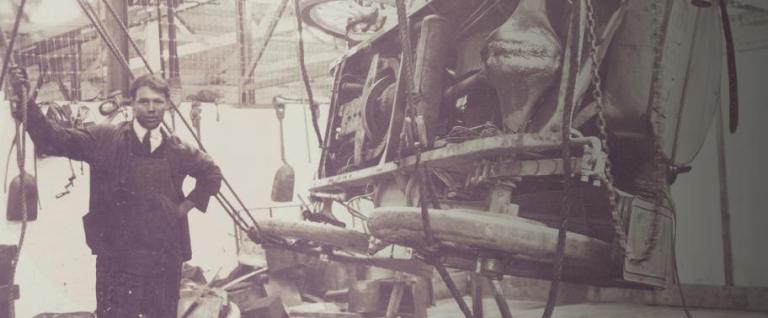Success is to be measured not so much by the position that one has reached in life as by the obstacles which he has overcome.
–Booker T. Washington
By Bill Peel
R.G. LeTourneau was one of America’s best-known Christian businessmen in the mid-twentieth century. He made and gave away a fortune during his lifetime, and he founded a university. Although he had only seven years of formal education, LeTourneau died with 300 patents in his name and a degree in the best education possible: adversity.
But the road to his success was not a smooth ride. His path was circuitous at best and peppered with enough potholes to make most anyone doubt God’s goodness. But not LeTourneau. He believed that when God has a job for you to do, He’ll give you the strength and the ability to do it–even when the going gets tough.
Below are LeTourneau’s responses to some of the adversities he faced, excerpted from his autobiography, Mover of Mountains and Men.
His first business went bankrupt due to the mismanagement by his business partner.
Speaking as I do as often as eight times a week, I’ve heard myself introduced so glowingly that I wonder who is being described. And what do I think about when I hear myself presented as a “Horatio Alger character born to succeed,” or a “gifted genius who does not know the meaning of failure”? I think of the closing months of 1918. I ran into the first trouble the day I returned to the garage and found we were bankrupt. I simply couldn’t believe it. The most prosperous garage in town had gone broke?
Later he would write about the futility of blaming others for setbacks.
You will never improve unless you blame yourself for the troubles you have. Then when you realize your troubles are your own, you can take them to the Lord, and He will give you guidance. Just don’t make the mistake of asking Him to believe the other fellow was to blame.
At age 30, while struggling to pay off his bankruptcy debt, LeTourneau and his wife lost their infant child.
LeTourneau returned home one day “as low as a man can get,” only to find that his baby son Caleb was a victim of the influenza epidemic raging at the time. Numb with sorrow, he cried out to God. Later, reflecting on his inability to control his world during those dark days, he wrote,
From my lesson that night I can now say that when a man realizes that spiritual things are worth more—and certainly they will last when material things are gone—he will work harder for spiritual things. I discovered then that God loves us so much that He wants us to love Him in return. He wants us to cooperate with His program. Matthew 6:33 says, “But seek ye first the kingdom of God, and His righteousness; and all these things shall be added unto you.” That I had not been doing. I had been seeking first my own way of life, and I firmly believe God had to send those difficulties into our lives to get us to look up into His face and call upon Him for His help and guidance. I know that when I returned to the garage it was with a new attitude.
Around twenty years later, LeTourneau lost an adult son in a plane crash just before WWII. LeTourneau used his loss to drive productivity in his factories. By building the best machines possible for the war effort, he hoped he could help save other parents’ sons on the front line. From Pearl Harbor to V-J Day his company manufactured 70 percent of the earthmoving equipment used by the Seabees and Corps of Engineers to win the war.
LeTourneau faced numerous cash-flow problems and often wondered if he would be able to keep his business afloat.
Sometimes he would find himself in need of an attitude adjustment.. He described one such occasion:
Deeply worried about all the contracts I couldn’t fulfill, I got down on my knees and prayed, “Don’t let me down now, Lord. I’ve got all this work, and if You let me down, I’m ruined.” Right there I saw my mistake. “Strike that out, Lord,” I hastened to say. “I didn’t mean that. I’m not asking You not to let me down. I’m asking You to help me not let You down. I’m not asking to use You. I’m asking You to use me.” That had been my trouble all along. All wrapped up in my own petty problems, I had once more begun to think I was working for myself instead of the Lord. I slept well that night, and when I woke up, I had the answer to my problem.
LeTourneau refused to give up, even after he was severely injured in a head-on car wreck that killed five people.
Pulled from the car, LeTourneau laid on the roadside, and expected to die,
Then I looked up to Heaven, and my words are still with me. “Lord, this could not have happened if You hadn’t permitted it, because I know ‘all things work together for good to them that love God.’ Lord, it’s all right with me. Although I may not understand, I have confidence to know that it will be all right.”
Three days later, encased in plaster from neck to foot, LeTourneau traveled via ambulance back to his home, which was two states away. Although he didn’t know if he would ever walk again, he did know that he could still design machinery. When he arrived home, his first design was a stretcher on which he could be wheeled through his factory for inspection tours.
Dr. Dale Lunsford, President of LeTourneau University describes LeTourneau like this: “Through bottomed-out economies, personal catastrophe, bad business partners, short deadlines, breakdowns, hard decisions—and repeatedly facing off against real mountains–he knew who God was, so he knew who he was.”
Knowing who God is gives us the ability not only to live through adversity but to learn through it as well.
This is what the LORD says: “Let not the wise man boast of his wisdom or the strong man boast of his strength or the rich man boast of his riches, but let him who boasts boast about this: that he understands and knows me, that I am the LORD, who exercises kindness, justice and righteousness on earth, for in these I delight,” declares the LORD. (Jeremiah 9:23-24)
From the Center for Faith and Work at LeTourneau University. Image: CFW.













